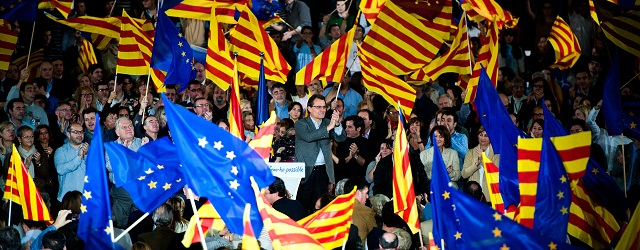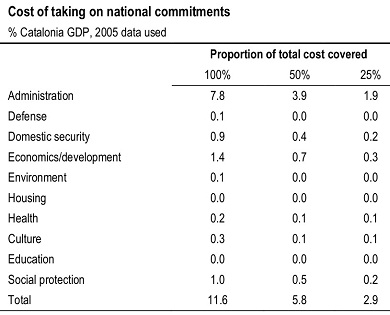One can only encourage the Spanish central government to read with a more accurate eye Sunday’s results of the snap election in Catalonia than Madrid-headquartered press did this morning.
Their commentators and leader articles mostly found laughable centre-right Convergència i Unió’s attempt to incarnate the referendum project in the person of president Artur Mas. Catalans sort of reckoned so, too. But in a 70 percent-turnover poll, the region’s thirst for a separate State raised a deafening voice.
The parliament in Barcelona hosts today an Artur Mas freed of his less confident voters–and 12 seats that have gone with them–and the historically pro-independence Republican Left of Catalonia (ERC) at his side. They are not alone. Out of 135 MPs, some 87 will give support to a referendum for a new State within the European Union. Only 28 MPs belong to pro-Spain parties, and other 20 championed a federal solution. Mr Mas, an economist, with a simple although sufficient majority of 50 seats won the politics of his bid yet failed to teach Catalans the financials of their collective endeavour. And here is where the whole independence kerfuffle of Catalonia is likely to go awry.
Using 2005 figures, a recent technical study by JP Morgan analysts concluded that the cost of taking on national commitments would reach up to 11.6 percentage points of the Catalan GDP. Pro-independence parties complain Spain’s central administration takes between 7 percent to 9 percent of Catalonia’s GDP annually in fiscal transfers.
“Over the long term an independent Catalonia may be fiscally credible,” the research paper noted, “but there are doubts about real transition costs in the near-term. Catalonia is unlikely to significantly improve its fiscal path (just by 3 percent).”
Perhaps amid the current disastrous crisis in developed countries a 3 percent surplus–“under a benign scenario,” that is with “minimal disruption to trade with the rest of Spain”–sounds more enticing than experts believe. This is in line with a UBS report, which put the probable Catalan fiscal surplus at 4 percent before warning that the region’s economy would entirely implode if ousted from the European Union.
And for all its industrial tradition, as Credit Suisse reminded Catalan voters a week prior to the election date, “Only last year, and for the first time, its foreign total balance managed to register a surplus. This was largely thanks to tourism, with foreigners increasing their spending in Catalonia by nearly 15 percent over the last two years while Catalans are reigning in their spending abroad.”
The Catalan economy might just survive independence. Prospects of what awaits beyond the first years are a matter of debate, and the horizon could seem dreamier depending on who paints it. But budget pain is an inescapable fate in the short-term: “Look at the Catalan bonds, despite state guarantee and bailout, and the optimistic figures given on the possible independence,” fund manager Daniel Lacalle explained days before the election, “They are still trading at a risk premium to the Bund of about 900 basis points and with an average of 16% discount for the 2015-2016 maturities. This does not indicate any kind of institutional credibility.”
By having chosen anti-austerity ERC as Mr Mas’ companion–and 13 MPs from equally anti-budget cuts Iniciativa per Catalunya, and three further seats for the even more radical Candidatura d’Unitat Popular–, Catalonia sent yesterday a clear message to Madrid and Brussels, but also to the markets and investors. The region is determined to be recognised, and treated, as a nation. Sadly, Catalans appear incapable of shouldering the bill that comes attached to it.







Sadly, Catalans appear incapable of shouldering the bill that comes attached to it?
Meaning?
There is a majority of parties now in the Catalan parliament in some degree or another against public spending cuts (ERC, PSC, ICV, CUP), but there is no market access. In the aftermath of a possible independence, this situation is unlikely to change. With no external credit, voters on Sunday basically said they want to go ahead with the ‘national process’ but have mainly elected parties with no credible plans to pay for it.